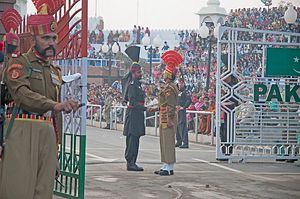Amid increased tensions between India and Pakistan after an attack on Indian troops in Uri, Kashmir, earlier this month, Prime Minister Narendra Modi’s government has vowed to isolate Pakistan internationally. One way this has manifested itself already is a decision by India to not attend this year’s summit of the South Asian Association for Regional Cooperation (SAARC), a regional organization in the subcontinent.
Subsequent to the decision of the Indian government, the SAARC summit, which supposed to be held in November in Pakistan, quickly fell apart. Bangladesh, Afghanistan, and Bhutan all pulled out of the summit as well, with Bangladesh citing continuous interference by Pakistan in its internal affairs. This is somewhat of a diplomatic and geopolitical victory for India. It will likely speed up the integration and growth of South Asia under Indian leadership, but unfortunately, the region’s second largest country, Pakistan, will increasingly miss out on this.
SAARC has so far been fairly ineffective, failing to enhance regional integration and cooperation to any level nearing that of the neighboring Association of Southeast Asian Nations (ASEAN). South Asia is the least interconnected region in the world. This is largely due to Pakistan’s behavior. For example, it refuses to let Indian trucks pass through it overland en route to Afghanistan, putting a damper on regional transportation and interconnectivity.
Moreover, it is unlikely that Pakistan will change its behavior anytime soon. Isolation and sanctions have been attempted before, but have had little impact on Pakistan’s long-term behavior. Pakistan has always been able to leverage its strategic location and ties with other countries to get through hard times before, emerging with largely the same tactics as before. Two years ago, I argued that for SAARC to work, India and Pakistan must resolve their differences. As this seems unlikely, it is time for the other member states of SAARC to proceed with the “small SAARC” option.
This is a SAARC without Pakistan.
“Small SAARC” would have close-knit economic integration and free trade, transportation interconnectivity, and perhaps one day open borders and a common currency. For a country to join this enhanced SAARC, such as Pakistan in the future, it would have to accept these basic elements of the organization. Other than Pakistan, all the other countries in the region want more integration, so it is likely that without Pakistan to oppose this, things would proceed at a steady pace. Integrating Afghanistan without Pakistan to provide a land corridor to the rest of South Asia would be difficult, but could be overcome by using a route through Iran, possibly involving Iran more in South Asian affairs. It is not inconceivable that SAARC would one day include Iran, but the organization has to remain geographically defined if it is to have any meaning.
According to the current SAARC charter, this is no mechanism for removing a nation. The charter merely states that decisions would be taken on the basis of unanimity. Therefore, several other options are possible. Pakistan, for instance, can be persuaded to withdraw of its own accord. The other states could unanimously agree to suspend Pakistan under certain interpretations of the charter. Or the other states could simply form a new organization to replace SAARC, which would make the old charter superfluous. In any case, a move toward greater integration in South Asia would probably involve writing a new charter.
It is clear that Pakistan is no longer amenable to SAARC and its goals and that, given the circumstances, it is an obstruction to closer integration for the other states of South Asia. This is unfortunate since many people in Pakistan, especially businessmen and pro-business politicians such as Prime Minister Nawaz Sharif, seem to favor closer economic ties with India. Unfortunately, the Pakistani security establishment won’t have it. Therefore, it is time for Pakistan and SAARC to part ways. Pakistan should leave of its own volition or it should be expelled.

































